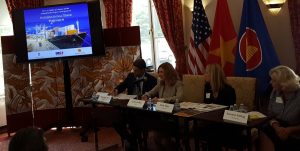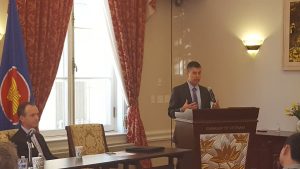The California Chamber of Commerce joined trade specialists from across the nation last week at sessions focusing on reasons to support the Trans-Pacific Partnership (TPP).

Susanne T. Stirling, CalChamber vice president of international affairs, was among speakers at a panel highlighting grassroots TPP activities at the September 22 Annual Trade Symposium, presented by the U.S. Chamber of Commerce and the National District Export Council (DEC). The event was held at the Vietnam House on Embassy Row in Washington, D.C. Vietnam is one of the 12 members of the pending TPP.
The symposium was opened by Christopher Wenk, executive director, international policy for the U.S. Chamber, and Philip Pittsford, the outgoing chair of the National DEC.
Welcoming all 75 symposium participants was Vu Le Thai Hoang, minister counselor and chief political officer, Embassy of the Vietnam to the U.S. Hoang accompanied Ambassador Pham Quang Vinh, when he visited the CalChamber on October 20, 2015.
The first symposium panel presented arguments for the TPP from the perspective of different sectors: manufacturing, financial services and insurance, and agriculture.
The second symposium panel, including Stirling, focused on engaging employees, suppliers, customers and the community. Stirling gave a quick recap on CalChamber work with local chambers of commerce to encourage businesses to write letters in support of the TPP.
She reminded listeners that Pacific Rim nations aside from those in the Americas are making progress on a separate trade agreement and that the United States will be excluded from the many benefits if the other agreement is finalized before the TPP.
The keynote speaker was Drew Quinn, deputy chief negotiator for the TPP at the Office of the U.S. Trade Representative. Quinn spoke at the CalChamber International Forum focused on the TPP in May.
National Export Council

Stirling also joined colleagues from across the country at related meetings of the National DEC in Washington, D.C. The National DEC is made up of the 60 regional district export councils. The 1,500 DEC members around the country all are appointed by the Secretary of the U.S. Department of Commerce. Stirling serves on the Northern California DEC and on the Steering Committee of the National DEC. The mission of the DECs is to work with the Commerce Department on export promotion and commercial diplomacy.
Welcoming members to the National DEC forum were Antwaun Griffin, deputy assistant secretary for U.S. operations at the Commerce Department; and Judy Rising Reinke, deputy director general of the U.S. Commercial Service, who spoke at the CalChamber in May.
Policy issues of concern to the DECs are timely congressional approval of the TPP, the Transatlantic Trade and Investment Partnership, and continuation of the Export-Import Bank. Other activities include the promotion of the Export University, a program designed to educate small and medium-sized businesses about potential export endeavors.
There was also a joint event of the DEC members and the Centers for International Business Education and Research (CIBERs). Congress created the CIBERs to increase and promote the nation’s capacity for international understanding and business competitiveness. Various universities around the country host the 17 centers.
Trans Pacific Partnership
The large and growing markets of the Asia-Pacific already are key destinations for U.S. and California manufactured goods, agricultural products, and services suppliers, and the TPP will further deepen this trade and investment. U.S. goods exports to TPP nations totaled $680.1 billion in 2015, representing 45.2% of total U.S. goods exports. In 2015, California exports in goods with TPP members were $68.9 billion, making California the second largest exporting state to the region. Furthermore, 41.6% of California’s exports in goods went to TPP nations, supporting 1.9 million jobs in the state. Delaying congressional approval of TPP for just one year would cost the U.S. economy $94 billion.
The Asia-Pacific region is a key driver of global economic growth, representing nearly half of the earth’s population, one-third of global GDP and roughly 50% of international trade. The International Monetary Fund estimates that nearly two-thirds of world economic growth in 2016–2017 will be in Asia.
TPP puts U.S. workers first by establishing the highest labor standards of any trade agreement in history, helping small and medium-sized businesses benefit from trade, promoting anticorruption and transparency, and protecting U.S. workers from unfair competition. All 12 of the negotiating countries also have agreed to adopt high standards in order to ensure that the benefits and obligations of the agreement are fully shared.
The CalChamber, in keeping with long-standing policy, enthusiastically supports free trade worldwide, expansion of international trade and investment, fair and equitable market access for California products abroad and elimination of disincentives that impede the international competitiveness of California business. New multilateral, sectoral and regional trade agreements ensure that the United States may continue to gain access to world markets, resulting in an improved economy and additional employment of Americans.
The TPP agreement is important as a vehicle for trans-Pacific-wide economic integration. This regional agreement sets a high standard that will enhance the competitiveness of the countries that are part of it and help facilitate trade and promote investment between them, increasing their economic growth and development.
Action Call
The CalChamber has sent a letter to the California congressional delegation. Please join us in writing see link. It is hoped the TPP will be brought up for congressional approval during the November lame duck session.
Staff Contact: Susanne T. Stirling

